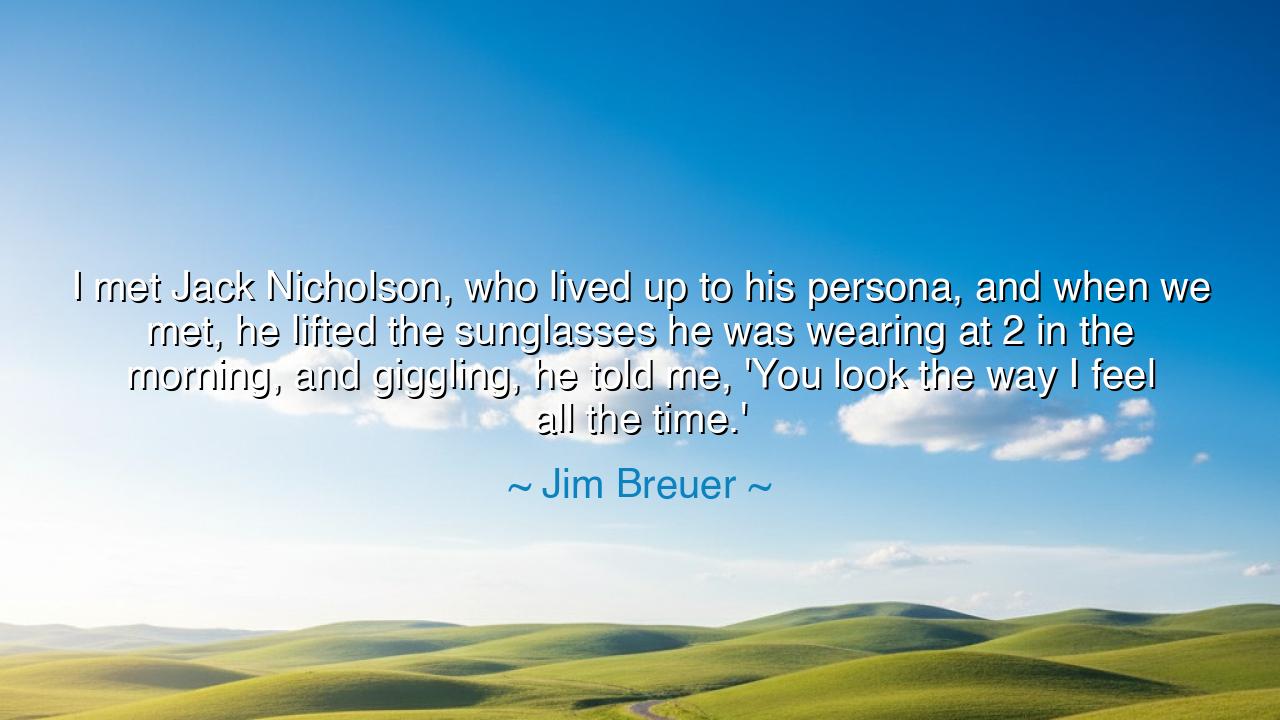
I met Jack Nicholson, who lived up to his persona, and when we
I met Jack Nicholson, who lived up to his persona, and when we met, he lifted the sunglasses he was wearing at 2 in the morning, and giggling, he told me, 'You look the way I feel all the time.'






"I met Jack Nicholson, who lived up to his persona, and when we met, he lifted the sunglasses he was wearing at 2 in the morning, and giggling, he told me, 'You look the way I feel all the time.'" Thus recounted Jim Breuer, weaving a tale both humorous and revealing, where the mask of legend momentarily slipped to reveal the truth beneath. For in this strange and simple exchange, we glimpse the eternal dance between persona and reality, between the image a man casts upon the world and the inner truth that only occasionally escapes through laughter.
To meet Jack Nicholson is not merely to encounter a man, but to stand before a myth—an actor whose life and roles blurred together until the boundary between person and persona seemed to vanish. The sunglasses at 2 in the morning are no mere accessory; they are a symbol of his defiance, his mystique, his unwillingness to fully surrender himself to the gaze of others. Yet, in lifting them for a moment, Nicholson allowed a glimpse not of the star, but of the man. His words to Breuer, “You look the way I feel all the time,” are both a joke and a confession: that behind the eternal mask of cool, there is weariness, madness, or perhaps a restless fire that never sleeps.
In truth, such encounters remind us that every great figure wears a mask. The Romans spoke of the persona, the mask worn by actors, which became the very word for identity. Nicholson lived within his, shaping it, protecting himself with it, yet also being consumed by it. Breuer’s tale reminds us that even those who appear larger than life are haunted by the same fatigue, the same restless energy, the same turmoil as the rest of us. It is only that they carry it with greater performance, turning their pain into myth.
History offers parallels to this moment. Recall Lord Byron, the poet who became the embodiment of the “Byronic hero”—brooding, daring, self-destructive. To his admirers, he was a living legend, yet his letters reveal loneliness, despair, and exhaustion beneath the mask. Or think of Errol Flynn, whose charm and roguish persona captivated millions, even as his private life unraveled in shadows. Like Nicholson’s sunglasses in the night, their masks were shields, hiding frailty behind myth.
Yet there is also strength here, for Nicholson’s laughter and playful confession reveal a wisdom: to acknowledge weariness without surrendering to it, to turn inner chaos into humor, to transform vulnerability into connection. In telling Breuer that he “looked the way he felt,” Nicholson created a bond, a recognition of shared humanity wrapped in jest. This is the mark of true charisma—not the denial of weakness, but the transmutation of it into something others can embrace.
The lesson for us is profound: do not be deceived by personas, whether in others or in ourselves. Every mask hides a living soul, often burdened with struggles invisible to the eye. Admire the persona, but never forget the person. And in your own life, do not let your masks consume you. Be willing, like Nicholson lifting his glasses in the dead of night, to reveal your true self—frail, tired, laughing still. In that moment of honesty, connection and understanding are born.
Practical action follows: learn to laugh at your own struggles, as Nicholson did; turn your weariness into humor, your burdens into stories that uplift rather than isolate. When you meet others, especially those who seem untouchable or distant, remember that beneath their sunglasses lies the same humanity you carry. And in your own life, do not fear the mask—it has its place—but remember always to lift it from time to time, to breathe, to be seen, to be real.
Thus Jim Breuer’s memory is more than a late-night tale of celebrity. It is a parable of masks, of laughter, of shared humanity in the midst of exhaustion. At 2 in the morning, beneath the dark glasses of legend, a man confessed the truth of his soul—and in so doing, revealed that even myths are human.






AAdministratorAdministrator
Welcome, honored guests. Please leave a comment, we will respond soon